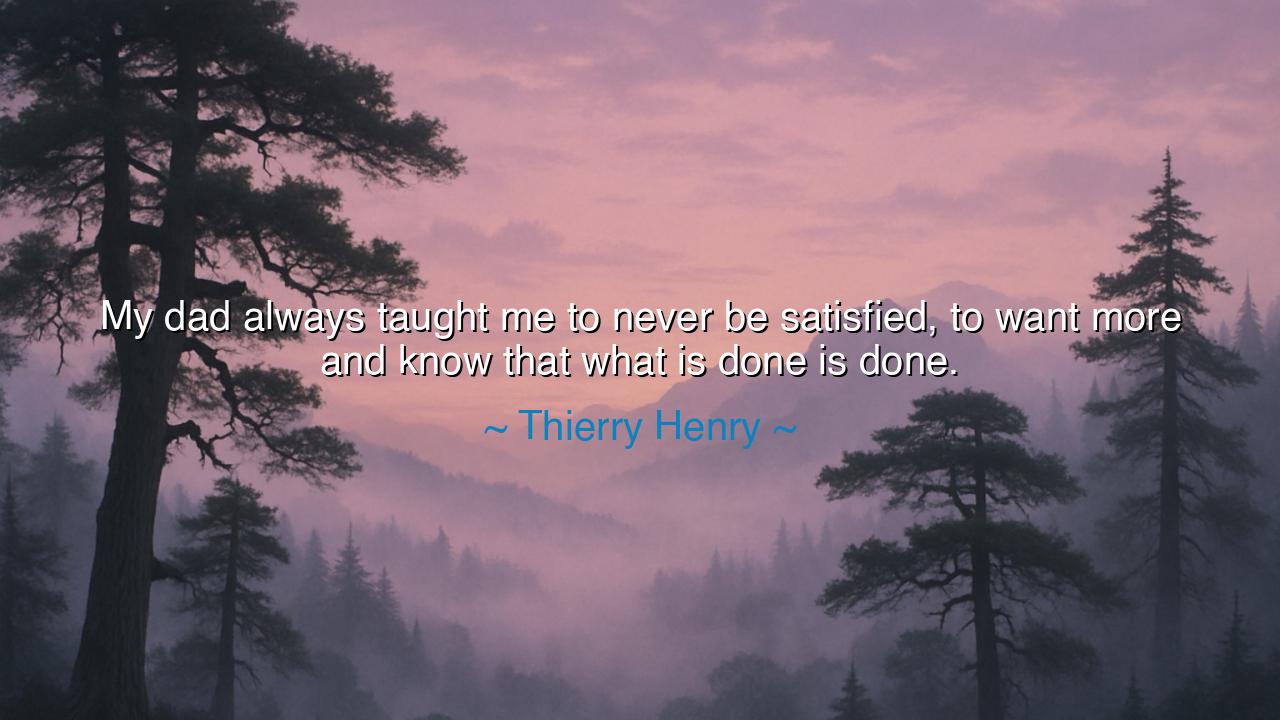
My dad always taught me to never be satisfied, to want more and
My dad always taught me to never be satisfied, to want more and know that what is done is done.






The words “My dad always taught me to never be satisfied, to want more and know that what is done is done,” spoken by Thierry Henry, are not merely about sport — they are about the eternal pursuit of excellence, the art of progress, and the wisdom of letting go. In this reflection, the great footballer unveils the creed that shaped his spirit: the belief that complacency is the enemy of greatness, and that to dwell on the past, whether in triumph or failure, is to become a prisoner of it. This teaching, handed down from father to son, echoes the ancient philosophy of discipline, ambition, and acceptance — the triad of forces that have forged heroes in every age.
To never be satisfied is not to live without peace; rather, it is to live with purpose. It is to understand that perfection is not a destination but a direction — a horizon that always retreats as we approach it, beckoning us to move further still. Thierry Henry’s father, Antoine, a man of strength and precision, raised his son with the understanding that greatness is born not from comfort, but from restlessness — that sacred hunger that drives the soul to rise beyond its limits. The ancients called this the fire within, the divine spark of arete — the striving toward one’s highest potential.
To want more, as Henry’s father taught him, does not speak of greed but of growth. It is the desire to refine the self — to play better, think deeper, love stronger. It is the inner command that whispers to the victorious: “This is not the end; there is still a higher peak.” In every field of human endeavor, from art to battle to science, those who advanced civilization were never content with what had already been achieved. Leonardo da Vinci looked at his own inventions and found them incomplete. Alexander the Great wept because there were no more worlds to conquer. Marie Curie pressed beyond discovery into sacrifice itself. Such spirits embody the same relentless call — the refusal to rest upon the laurels of the past.
And yet, the final part of the teaching — “what is done is done” — balances this hunger with wisdom. For while ambition drives us forward, acceptance frees us from chains. The past, whether glorious or bitter, cannot be undone; to linger in it is to lose sight of the path ahead. Many warriors fell not because they were defeated, but because they could not move beyond victory. The ancients told of Achilles, who triumphed over Troy but perished in his pride, unable to lay down the sword. True mastery, then, lies in knowing when to let go — to honor what has been, learn from it, and march onward without regret.
This teaching shaped Thierry Henry’s career, visible in every match he played. Whether scoring legendary goals for Arsenal or carrying France to victory, he never allowed himself to bask long in triumph. Reporters often asked him about his greatest goal, and he would smile and say, “The next one.” In those few words lives the philosophy his father carved into him: the belief that tomorrow’s work matters more than yesterday’s glory. Even when he missed, when he failed, he did not look back in despair — for what was done was done, and his eyes were already fixed on what lay ahead.
The wisdom within Henry’s quote is one every generation must inherit. To never be satisfied is to stay alive in spirit; to want more is to keep evolving; to accept the past is to remain free. Each of us faces moments of triumph and defeat — but the wise do not cling to either. Instead, they keep walking, carrying with them only the lessons of their journey. The true warrior, the true artist, the true human being — learns to balance fire and peace, ambition and acceptance.
So, to all who seek greatness: remember the teaching of the father to the son. Strive always, improve endlessly, but never look backward in bondage. When you fail, rise without bitterness; when you succeed, move without pride. For the past cannot be changed — but the future awaits the hand that dares to reach further. What is done is done — but what is yet to be done is infinite.






AAdministratorAdministrator
Welcome, honored guests. Please leave a comment, we will respond soon